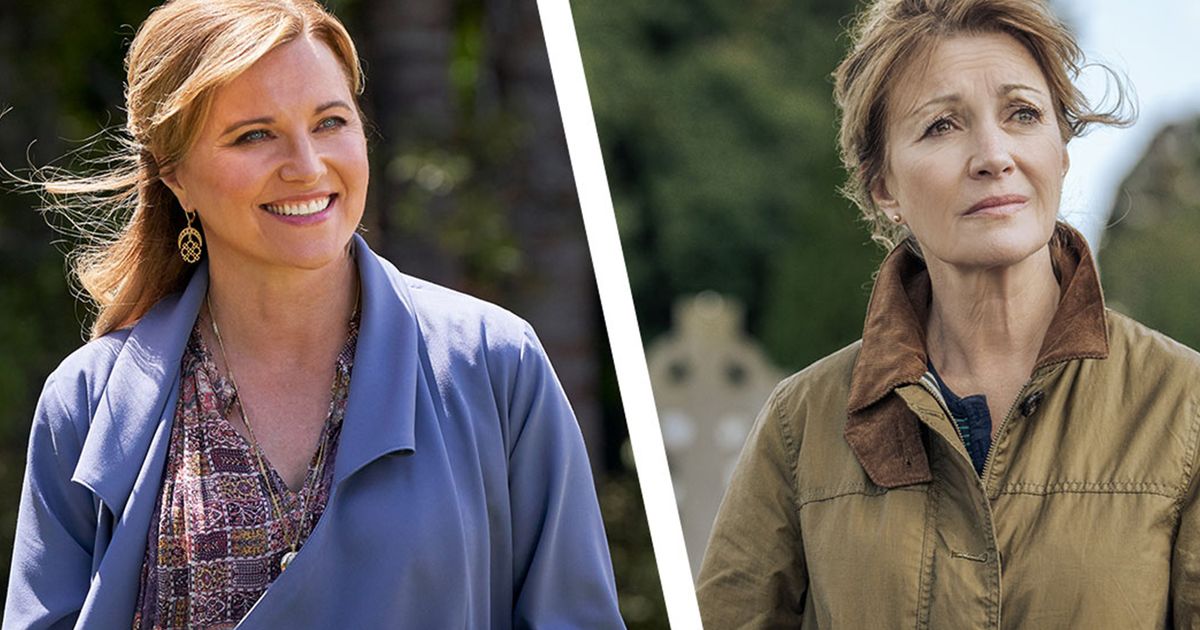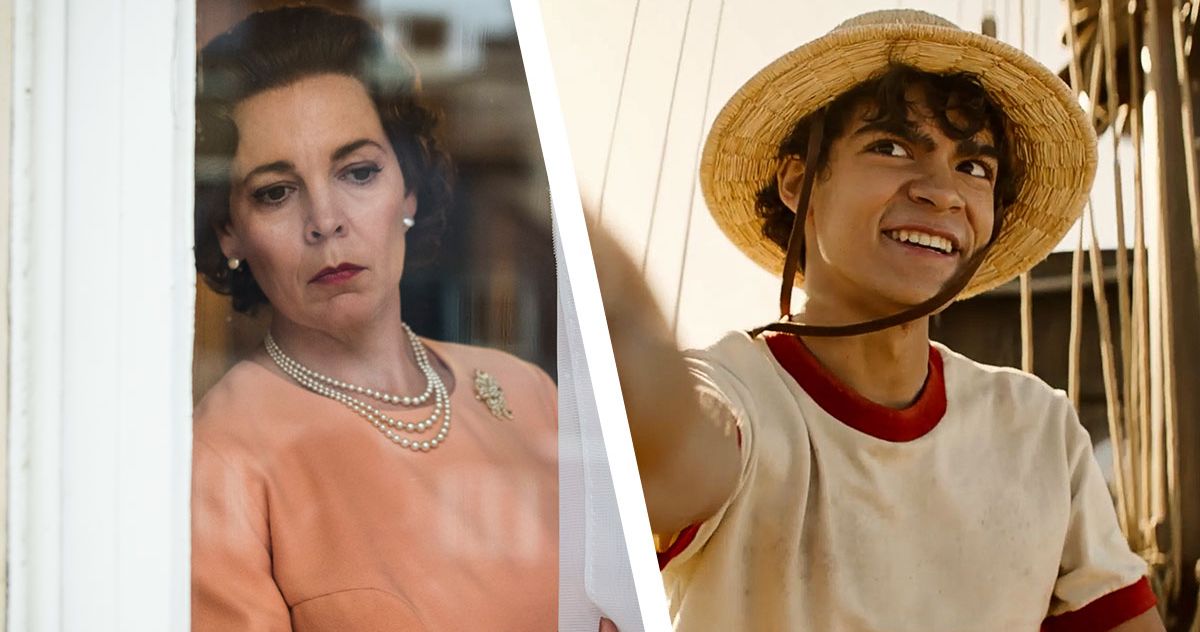Lucy Lawless and Jane Seymour, two of Acorn’s leading stars.
Photo-Illustration: Vulture; Photos: Matt Klitscher/AcornTV, Bernard Walsh/Zoe Productions DAC/AcornTV
Back when they first aired in the mid-1990s, there wasn’t a lot of obvious audience overlap between the Lucy Lawless–led Xena: Warrior Princess and Jane Seymour’s Dr. Quinn, Medicine Woman. While both Saturday-night hits were built around strong female leads, the former was an over-the-top sci-fi/fantasy adventure aimed at the under-35 crowd, while the latter was a family drama targeted squarely at boomers (and their even-older parents). Three decades later, Lawless and Seymour are once again headlining successful small-screen franchises, but these days, their two series have a lot more in common, including the same U.S. streaming platform: Acorn TV.
One of the pioneers of the specialty streaming space, Acorn is aimed at audiences who crave the sorts of programming Americans once found only on PBS Sunday nights or, during Peak Cable, on BBC America: cozy murder mysteries, period epics, and gritty crime dramas set in scenic locales far from America. Like Netflix, Acorn began life as a physical-media distributor, selling VHS tapes (and then DVDs) of international dramas and comedies. By 2011 — two years before Netflix debuted House of Cards — Acorn was ready to jump into streaming with a limited offering that let audiences watch a handful of shows online; in 2013, it launched the version of Acorn TV familiar to subscribers today. That was followed not long after by a slow move into co-producing its own originals, working with local studios to make series such as London Kills, Agatha Raisin, Dalgliesh, and, yes, those two aforementioned murder mysteries built around reluctant snoops played by Lawless and Seymour, respectively: My Life Is Murder and Harry Wild.
After its initial leap into streaming, the biggest milestone moment for Acorn came in 2018, when AMC Networks bought a controlling interest in the company and took over day-to-day management of the platform. The move immediately gave the longtime indie streamer a level of financial and marketing support it had never had before. While AMCN is hardly a Netflix- or even Comcast-size conglomerate, it does boast a powerful portfolio of cable and streaming platforms (AMC, IFC, Sundance, We TV, and BBC America) that reach many of the same viewers who might be interested in Acorn. AMCN execs wisely kept in place key members of Acorn’s content team, including senior VP of programming Don Klees, but they quickly began using their linear assets to market and promote their newly acquired niche streamer. More recently, AMC Networks has started cross-pollinating shows and movies between Acorn and its other brands, giving Acorn dramas such as My Life Is Murder runs on its cable networks or bringing some AMC-branded titles to Acorn. And starting next month, the broader-target AMC+ platform will begin streaming about a dozen titles from the Acorn programming library, complete with Acorn branding, in order to further expose the smaller platform to potential new subscribers.
As for Acorn’s overall performance, AMC Networks doesn’t break out how many subscribers its individual streaming platforms have, instead reporting on how many total paid customers it has (currently around 11.5 million). But there’s reason to suspect the company is happy with Acorn’s performance over the past six years. At a time when so many streaming platforms are drowning in red ink, “It’s accomplished what I call the holy grail of streaming, which is profitability,” says Courtney Thomasma, executive VP of streaming at AMCN. “We love the Acorn business.”
Buffering recently caught up with both Thomasma and Klees to talk all things Acorn, including what kinds of viewers the streamer is attracting, how AMC Networks will continue to grow the platform’s brand (including a possible move into the free-streaming space), and which of its earliest hits may be due for a revival.
Acorn has actually been around since the 1980s and Don, you’ve been with the company for most of that time. You’re a lot like Netflix in that you began as a physical-media company long before streaming was a thing. Tell me more about that history.
DON KLEES: I started in 2000 when we were starting to release the Poirot series on VHS, so it’s been a minute. We were a niche home-video distributor. We had a very strong business in selling British and related television. I say “related” because, for instance, some of our biggest, most successful titles — even before Acorn TV — came from other places such as Canada. So Acorn was never strictly a British company. The watchword was always quality. Obviously, “British TV” is almost synonymous with quality, so of course, we leaned into that. And in a sense, nothing’s changed really since then.
I know streaming data works differently than demographic ratings data, but what can you tell me about who is watching Acorn? What’s the profile of your audience?
COURTNEY THOMASMA: We know a lot about who our audience is. And the Acorn audience — it’s probably who you think it is. We do see a lot of synergy with the BBC America audience on linear, and it’s probably a little bit more diverse than you would think, primarily female-skewing. But a lot of the shows do see high levels of co-viewing and a pretty even gender split. But the overall base is female, a little bit older, and really, really high education and income levels. These are viewers that have discretionary income and love to spend it on something that’s going to be a bit of a splurge or a luxury for them, which a lot of our viewers say Acorn is — part of that monthly indulgence. And not surprisingly, it’s a really intellectually curious and internationally minded audience.
We talk about the Acorn audience a lot as being armchair travelers. Our series are filmed all over the world: Britain, the U.K., Ireland, South Africa, France. One of the things they love most about these stories is getting to see these cultures and countries and environments. So it’s sort of like the dream audience just from a psychographic and demographic level.
You soft-launched your direct-to-consumer streaming platform, Acorn TV, in 2011, and then it morphed into the service we know today by 2013. The streaming wars have gotten a lot more intense since then, so I’m curious how you’ve evolved the mandate for the platform as the medium has changed. What was your goal then, and what is it now?
KLEES: In many respects, the filter process is not all that different: Quality is at the heart of it. There is an audience for this kind of quality programming, particularly in the mystery space, that is underserved and has been underserved by a lot of the outlets that are out there. We have known and continue to operate with that conviction that the audience for Acorn TV is one that wants the engaging characters, they want those different settings, that really strong sense of place.
My favorite police drama of all time is Homicide: Life on the Street, which took place and was filmed in Baltimore, up the road to me. What I loved about that show is it could not have taken place anywhere else. Whereas, look — I enjoy Law and Order. But Law and Order and those shows, they say it’s New York, but it could almost be anywhere, if you know what I’m saying. And I think that with Acorn shows, I think we have a little bit of that same quality you see with a show like Homicide: They feel like these stories just belong in this place.
AMC Networks took full control of the company in 2018. They’ve been making a huge push into streaming with their niche platforms, as well as AMC+. They’ve also given you a lot more resources, particularly with marketing and promotion. Has the service changed much under AMC, and how do you think you fit into their bigger gameplan?
KLEES: I think Acorn in particular really fits AMC’s strategy because we’re not out here trying to — it’s not about world domination at all costs. We’re a complementary service. An analogy that I use often when I’m trying to explain Acorn and our mindset is: It is the difference between a department store and a boutique. Look, Nordstrom, Macy’s, whatever, they have great stuff, a wide range of stuff. But there are also boutiques where you know the staff, and they have a certain focus. The same thing kind of carries through with streaming. I’m going to a big platform when I’m looking for certain items, but as a viewer, I’m also going to a more niche-focused entity.
That said, I think that we really feel now the freedom to maybe stretch the brand. We obviously have a very loyal audience, which I certainly don’t ever take for granted. We know that people have expectations of us, and so we obviously want to satisfy those expectations. But I think we would like to do it also in a way that maybe surprises the viewers too, having something set in a place they maybe didn’t expect to see here.
And Courtney, I guess the converse is, what do you think Acorn brings to AMC Networks’ broader streaming portfolio? You made the decision when you launched AMC+ and folded the full offering of platforms like Shudder and Sundance into it not to do the same with Acorn. That would seem to indicate you thought its audience was strong enough to support it being completely stand-alone.
THOMASMA: I think probably the most relevant information is that Acorn is our second-most popular streaming service behind AMC+. It’s one of the most tenured, targeted streaming services in all of streaming. The brand is incredible and the business is equally incredible: Acorn has accomplished what I call the holy grail of streaming, which is profitability. So we love the Acorn business, we love the Acorn programming, and I especially love the Acorn subscriber base. I meet them everywhere I go. I joined the Facebook group, and it’s some of the most engaged and actually informative conversation I’ve seen on Facebook. These subscribers know the catalogue really well. They are not shy about giving recommendations, good and bad. And they love being a part of the Acorn community. So for us, it makes sense to keep this brand supported and healthy, and then think through ways strategically about how to window content and use the AMCN ecosystem to grow the Acorn brand and support the Acorn business.
You’ve already started doing that over the last few years, right? Using Acorn to promote AMC programming, and vice versa?
THOMASMA: We think there’s a lot of synergy just from an audience and content point of view, that we can use one service to support the other. So last year we offered the first season of AMC’s Dark Winds on Acorn, before season two premiered on AMC and AMC+. It was a bit of a test because Dark Winds is not an international show. It is a homegrown, U.S.-based AMC original. But it checked off so many of the boxes of what makes an Acorn show: A great compelling mystery, characters you can root for and a real sense of place. So we were going to just do a one-month window to just put it up on Acorn and see if anyone responds. Season one was so well-received, it performed so well on Acorn, that we ended up extending the run twice and are already planning a similar window for season two. We did the same thing last year with Harry Wild: We carved out a window for season one on AMC+ to help drive into the season two premiere on Acorn. So you’ll be seeing a lot more of that kind of strategic show-sharing. We think it is nice to have two big, complementary services that can support each other.
As you ramp up the cross-promotion, how much original programming do you try to weave into the Acorn lineup every month? In addition to shows you acquire from other international platforms, how often do you want to bring out a new Acorn original, or a returning one?
KLEES: We never want to be doing so many shows that they don’t all get their moment in the sun, so to speak. So right now, our cadence is that each month we strive to have at least one key tentpole sort of release among our originals. And it’s a mix of new programs and returning series. We’ve been very fortunate that a lot of our series do end up being very well-received, so that’s why, for example, production just started on series three of Whitstable Pearl. But at the same time, we’re also looking at the next thing we should be launching, and that’s why we’ve got the upcoming series Ellis, which stars Sharon D. Clarke. It is currently shooting in the U.K. and should be on Acorn TV in the fall.
One thing I also feel strongly about is the need to recognize the real variety of shows in the mystery and crime drama categories. It is important to have those lighter shows, and as well as the ones that just really go a little deeper into the soul.
Right — there’s a mix of “cozy” murder mysteries on Acorn as well as some shows with darker tones. I actually just discovered one of your first originals, London Kills, which I found more gripping than most U.S. cop procedurals. I think the last season was in 2022, so is there any chance we might get more of it?
KLEES: Nothing is set yet, but we are talking to the producer about how the show might continue. I remember a couple years back, some friends of mine, they were traveling somewhere and they stayed at a hotel where Acorn TV was an option, and they just totally randomly started watching London Kills. And they were like, “Is there going to be more?!” I think that’s probably one of the shows I’m asked about the most because that’s one that definitely has struck a chord with people.
So Courtney, Don talks about not needing Acorn TV to dominate the world, but AMC Networks is a business and you obviously want to get the platform to be as big as possible without diluting the brand that has made it so successful. What exactly are you thinking is a reasonable and realistic growth story for the service?
THOMASMA: We all agree, up to our CEO, about the potential for Acorn. It’s a great business as a stand-alone. So we really are focused on being strategic with measured investment to continue growing the content slate, and growing the brand. That’s why we’ve been out at the forefront of expanding our distribution, with partners like Apple, Amazon, and Roku. We’ve been somewhat platform-agnostic: We want to make the service available on any platform where a potential Acorn viewer could be and make it as easily accessible to them and as broadly distributed as we can. Distribution, I think, was a key part of the early growth stage of Acorn.
At this point, we feel like the biggest missing piece is awareness. So we’ll be building that really by leaning into our own platforms and ecosystem. We have the advantage of having five linear television networks, having a film studio, and having six other targeted streaming services. We’re trying to be really intentional around how we actually expose the Acorn programming to the right audiences at the right time and then let the programming do the work that it’s meant to do. We’re also focused on the cross-promotional opportunities across that ecosystem.
How is that manifesting itself?
THOMASMA: Probably the biggest splash that we’ve made is the new Acorn programming block on BBC America. It started last month with a “Mondays are Murder” framing, where we have new episodes of great Acorn originals every Monday on BBC America at the same time they’re streaming on Acorn. We kicked it off with the new season of Harry Wild, featuring Jane Seymour, which we’ve been co-premiering on both platforms. And then My Life Is Murder, with Lucy Lawless, started June 17. This is the first time we’ll really be actively co-premiering and promoting Acorn titles for linear viewers at the same time they’re available for Acorn. So we expect that to be just a big awareness boost for the service.
We’ll also continue doing dynamic windowing where it makes sense, whether it’s co-premieres of big shiny new AMC or BBC America originals, like Monsieur Spade or Happy Valley or continuing to circulate our library across our platforms where we see compatible audiences.
And we’ve been diving into a working partnership with our film distribution company, IFC Films, in earnest. Last year, we co-premiered a movie starring Sally Hawkins, called The Lost King, and it did so much better than our expectations on Acorn. And last month, we co-premiered the Cannes award winner The Taste of Things, which is a sumptuous, beautiful French-language drama about food and love starring Juliette Binoche. It premiered on Acorn at the same time it premiered on AMC+. We think leveraging the power of the ecosystem infuses the service with some bigger, splashier, high-profile premieres.
You mentioned BBC America, a network which obviously is tied to an iconic U.K. brand and has itself done a number of great original series over the years. I know things in cable are a lot more challenging right now, but would you ever consider taking one of your linear networks and rebranding it as an Acorn channel? Or maybe putting the Acorn name on a free, ad-supported (FAST) streaming channel the way you have with brands like IFC and AMC proper?
THOMASMA: I wouldn’t rule out any of that. One of the big things that we’ve been focused on as a company, and I’ve been focused on over the last year, is breaking down the walls and silos. At first, it was between linear and streaming, and this year it’s really focused by breaking down any kind of brand silos that are up and thinking holistically across our whole ecosystem. We’re really excited about “Mondays are Murder” on BBC America, but I don’t think this is the end of potential innovation or other opportunities you might see across our platforms in support of Acorn, because as you said, there is a lot of overlap.
I think FAST is a really interesting territory to explore, and I could see a case where the lighthearted and definitely the blue sky, cozy crime aspect of the Acorn programming could work. I’ve gotten sucked into a bunch of Acorn binges, just because it’s so delightful and it makes you feel good. So I think that could work really well on that platform.
I get why it makes sense to keep Acorn TV as its own platform and not just fold all of its content into AMC+. But bundling is something that’s becoming very big in streaming right now. Would you ever consider offering AMC+ subscribers the chance to get Acorn at a discounted rate, or vice versa? Or letting people add Acorn TV to their AMC+ subscription so they can stream it all in one app?
THOMASMA: I don’t have any news to share on that, except that we are very interested in exploring those kinds of models. This is just, as I’ve said, such a unicorn of a business. And really what makes it what it is, is the subscriber base. They’re loyal and passionate and opinionated and they love good programming. Don’s mission is to super serve an underserved population of American viewers that love this great, complex, quality international programming. And we’re happy to be doing it.















